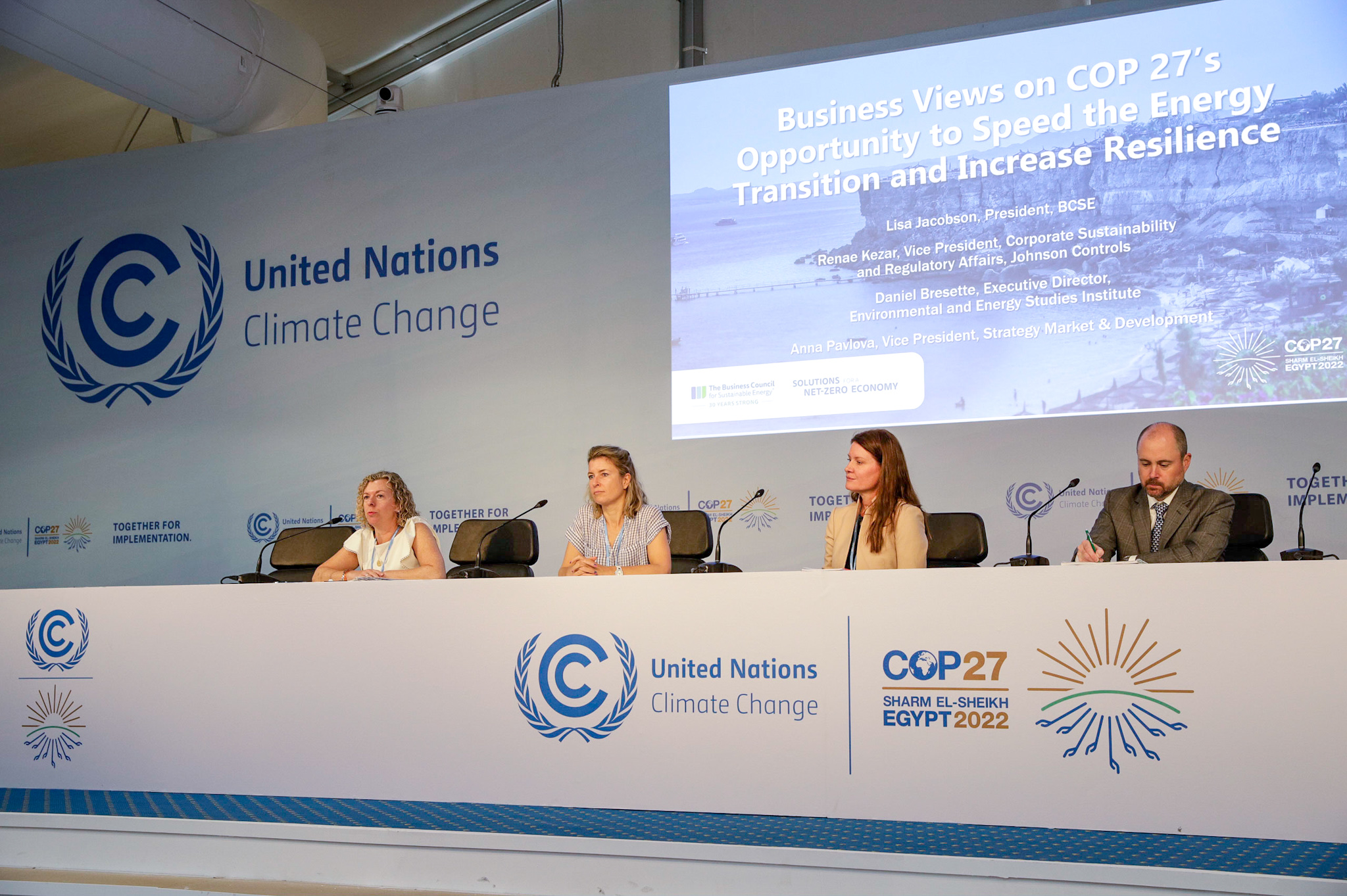By Laura Tierney, Director of International Programs, BCSE
As the desert dust settles from 45,000 people that descended upon the resort town of Sharm el-Sheik, where Egypt hosted the 27th Conference of the Parties (COP 27) to the United Nations Framework Convention on Climate Change (UNFCCC), BCSE is reflecting on the outcomes. Governments came together on a landmark decision to create a Loss and Damage Fund, but the global community did not take widespread actions to raise ambition by 2030.
Here are a few of BCSE’s take-aways from COP 27:
Together for Implementation is a rallying cry that goes beyond a COP 27 motto.
The focus of government negotiations in Egypt aimed to move the needle on ambition, establish credible rules for international carbon markets, and identify new streams of climate finance. BCSE and other stakeholders in the “greater metropolitan area” of the COP delved into what partnership – on policy, finance, and technology – looks like.
BCSE hosted several of these complex conversations at COP 27 around energy security, corporate climate action, solutions deployment, and community engagement.
The United States and American clean energy industries are in the strongest position to date to accelerate the energy transition needed to meet the collective goals of the Paris Agreement.
To borrow an oft-used term from the United Nations, the “enabling environment” created by the suite of recent U.S. policy actions, including the Inflation Reduction Act, the CHIPS and Science Act, the Bipartisan Infrastructure Law, and the ratification of the Kigali Amendment to the Montreal Protocol, has positioned the United States to lead.
The critical step in delivering on U.S. leadership is for Congress to increase the overall level of U.S. foreign development assistance and provide continued support for multilateral and bilateral international clean energy and climate change programs in the FY2023 federal budget. BCSE made that case to Congress this week and hopes it will be addressed in the final budget deal reached in the coming weeks.
Addressing loss and damage is an opportunity for U.S. technology leadership.
BCSE believes that the business community, in partnership with governments, can provide investment, capacity building, and technology solutions to address disaster response, resilience, and adaptation needs faced by developing nations. BCSE hopes that the Loss and Damage Fund will find opportunities and establish mechanisms to leverage private sector capital.
Raising ambition is not only the work of governments.
We in the “real economy,” outside of COP blue or green zones, can show what is possible through our business actions. The business community can create market demand for clean energy and energy efficiency solutions. We can make the business case to our customers for smarter investments that deliver both mitigation and resilience benefits. By demonstrating what is possible, the private sector creates space for greater ambition. Already, businesses in the BCSE coalition are leading by example and addressing Scope 1, 2, and 3 emissions in their supply chains. There is no time left for empty pledges by governments or corporations.
Partnership will be the keystone of success on the pathway toward net zero.
Only by working together can we unlock the trillions of finance flows and deploy the array of technology solutions that are needed to provide reliable energy, reduce emissions, adapt to climate impacts, and create new economic opportunities in our communities.
In what President Biden described as the “decisive decade for implementation,” BCSE and its members are committed partners in the effort to deploy solutions that will help communities, companies, and countries achieve their 2030 climate goals. We must commit to work together – across political lines, industries, and borders – to figure out the practical rules of the road for implementation and start building the infrastructure that is required to realize our climate ambitions and vision for a net-zero future.
About the Author: Laura Tierney is the Business Council for Sustainable Energy’s director of international programs and communications.

